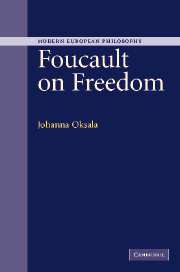8 - The freedom of philosophy
Published online by Cambridge University Press: 26 October 2009
Summary
Enlightenment is man's release from his self-incurred tutelage. Tutelage is man's inability to make use of his understanding without direction from another. Self-incurred is this tutelage when its cause lies not in lack of reason but in lack of resolution and courage to use it without direction from another. Sapere aude! ‘Have the courage to use your reason!’ – that is the motto of enlightenment.
(Kant 1784/1997, 7)Apart from the focus on the self, Foucault's ethics has another dimension: critical responding to one's time. Critical work encompasses the subject's personal work on him/herself, and also a critique of society, power relations and structures. While I have argued that to criticize Foucault's late work for a lack of normative guidelines misses the point of his effort to rethink ethics, the need for a normative grounding becomes more pressing in connection with politics. The subject's ethical work on him/herself may be based on unthematized values and experiences of liberation, but a shared conception of freedom seems necessary in emancipatory politics. Concepts empower, they incite discussions, arguments, dialogues. Normative ideals such as freedom, equality and justice articulate Utopian possibilities and give imaginations a concrete form that can be communicated and shared as a common political ideal and goal.
The connection between philosophy and politics in Foucault's thought is, to say the least, ambiguous. David Couzens Hoy (1998, 18–20), for example, argues that, although Foucault's writings seem to be politically engaged, exactly how they generate this effect is not clear.
- Type
- Chapter
- Information
- Foucault on Freedom , pp. 175 - 192Publisher: Cambridge University PressPrint publication year: 2005



